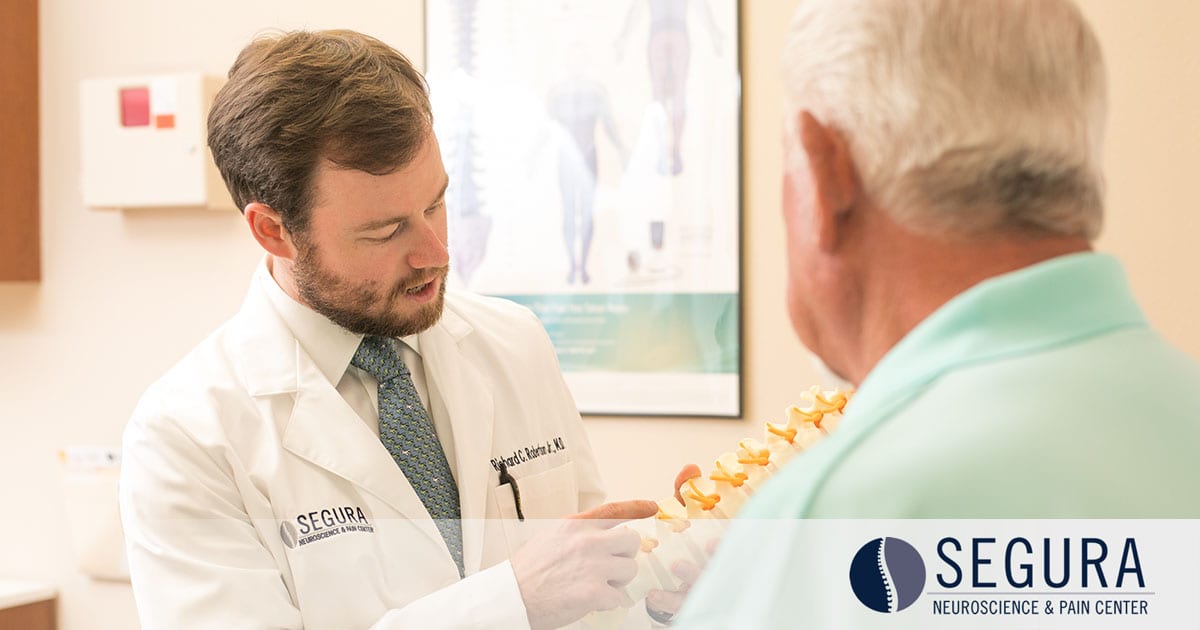
Why did you choose to be an interventional pain specialist?
“I knew I wanted to help patients live more fulfilling, happy lives," said Dr. Robertson. "I chose to become an interventional pain specialist because of a few powerful interactions I had with patients during my residency at Ochsner. I saw patients do things they thought they would never do again. Having the knowledge and skills to change a person’s quality of life is the most rewarding feeling in the world. It’s why I love what I do.”
What is interventional pain management?
“When I discuss treatment options with patients, I commonly discuss four different categories,” says Dr. Robertson.
Physical Therapy & Exercise
Patients are often afraid being active may cause their pain to intensify. To the contrary, Dr. Robertson says, “staying active and regular exercise are key components in managing pain.”
Medication
Placing the patient on the appropriate type of medication depends on the source of the patient’s pain. There are different types of medication which will be more effective depending on the type of pain the patient is having.
Minimally Invasive Procedures
Interventional procedures typically follow failure of more conservative management options including physical therapy, home exercise programs, over the counter medications, and often times prescription strength medications. Just as there are different classes of medication to treat pain, there are many different types of procedures available from an Interventional pain specialist. The type of procedure we offer patients depends on what we believe the primary pain generator to be.
Surgical Procedures
Dr. Robertson notes, “the path of pain treatment starts by first exhausting all minimally-invasive options. However, in some cases, a surgical procedure may be required to provide patients with long-term pain relief.” In cases like spinal stenosis, degenerative changes in the discs and joints of the spine can result in chronic pain. For example, a spinal cord stimulator can be surgically implanted under the skin to block these pain signals before they can reach the brain.
How are you different from other interventional pain specialists?
Dr. Robertson says, “I have experience treating a wide range of conditions. My particular background and training give me an advantage in treating shoulders. I’m one of the few physicians in the region who is trained to use radiofrequency ablation to relieve shoulder pain from rotator cuff injuries. This is a particularly good option for older patients who may not be good candidates for shoulder surgery.”
You are dual board certified. What does that mean?
"Board certification demonstrates a physician’s exceptional expertise in a particular specialty and/or subspecialty of medical practice," said Dr. Robertson. "I am double board certified by the American Board of Anesthesiology in anesthesiology and interventional pain management. "
Medical specialty certification in the United States is a voluntary process. While medical licensure sets the minimum competency requirements to diagnose and treat patients, it's not specialty specific.
Board certification shows a physician’s commitment and expertise in consistently achieving superior clinical outcomes in a responsive, patient-focused setting. The best measure of a physician’s knowledge, experience, and skills is his or her board certification. This standard is recognized by patients, physicians, healthcare providers, insurers and quality organizations.
What can new patients expect from Dr. Robertson?
Dr. Robertson’s goals are simple. “My first priority,” he says, “ is that my patients are safe. Second, I want to create a path for my patients to be as happy and as functional as they can be.” He feels it’s an honor to take care of patients and his ultimate goal is to allow patients to return to their productive, everyday life as quickly as possible without reliance on medications.
To schedule a consultation with Dr. Robertson to discuss your pain and a possible treatment plan, contact Segura Neuroscience and Pain Center today.
About Dr. Robertson

Dr. Richard C. Robertson, Jr., MD
Richard C. Robertson, Jr., MD - is double board certified by the American Board of Anesthesiology in anesthesiology and interventional pain management. He is a member of the Louisiana Society of Anesthesiologists, American Society of Anesthesiologists, American Society of Regional Anesthesiologists, and North American Neuromodulation Society.
This website is not intended provide specific medical advice, medical diagnosis, opinion, treatment or services to you or to any other individual. Through this website and links to other websites, Segura Neuroscience & Pain Center provides general information for educational purposes only. The information provided in this site is not a substitute for medical or professional care. You should not use this information in place of the advice of your physician or other healthcare provider. Segura Neuroscience & Pain Center is not liable or responsible for any advice, course of treatment, diagnosis or any other information, services or product you obtain through this website.
